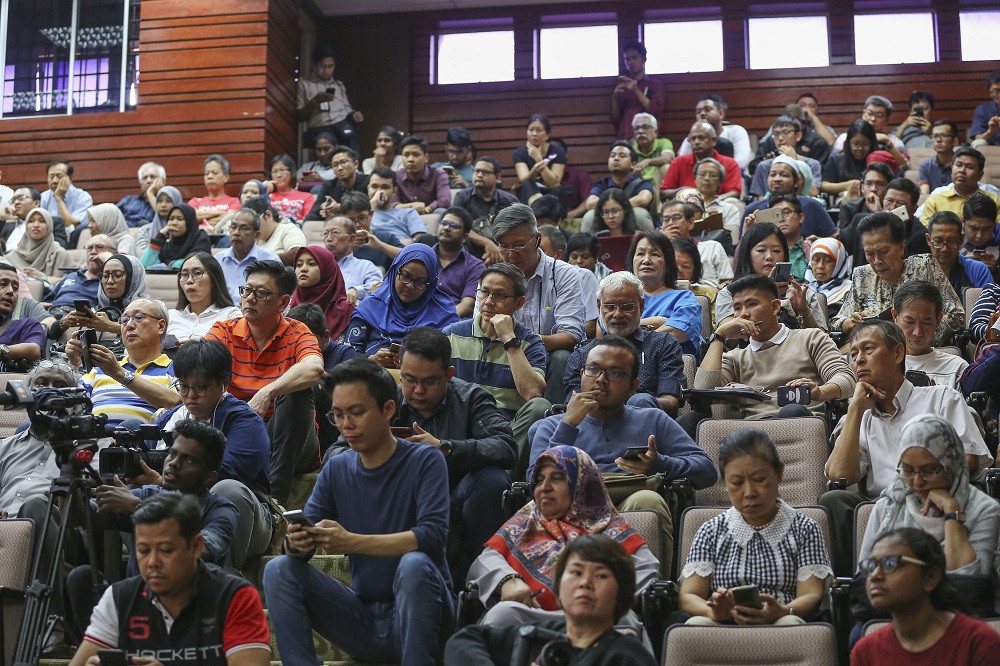KUALA LUMPUR, April 27 — The four law lecturers who prepared a paper to warn the Malay rulers of the alleged danger of Malaysia’s acceptance of the Rome Statute were today criticised in a forum as being “intellectually dishonest” and having misled the royalty.
The four academics are Universiti Teknologi Mara’s deputy vice-chancellor and the dean of its Faculty of Law Professor Datuk Rahmat Mohamad, International Islamic University of Malaysia’s law lecturer Assoc Prof Shamrahayu Ab Aziz, Universiti Sains Islam Malaysia’s (USIM) law lecturers Fareed Mohd Hassan and Hisham Hanapi.
They were invited to attend the forum but did not turn up for the event.
Universiti Kebangsaan Malaysia law graduate Asheeq Ali Sethi Alivi, who was one of the nine student activists who leaked the paper, bluntly criticised the four academics’ paper.
While thanking them for writing the paper which sparked intellectual discussion regarding the Rome Statute of the International Criminal Court, Asheeq Ali also claimed that the paper was “stupid”.
Asheeq Ali said the academics had argued in their paper that Malaysia’s prosecution of those from the lesbian, gay, bisexual and transgender community or based on sexual orientation would be considered a crime against humanity, but said there was no such mention of “sexual orientation” in the Rome Statute.
“I say they lied to the Conference of Rulers, that’s why I want action taken against them,” he said, blaming them for the “confusion” regarding the Rome Statute.
“I respect them to the maximum level, but we should stand with integrity and we should stand with honest opinion, and not together with such stupidity and dishonesty even though they are professors,” he said.
Asheeq Ali was one of the panellists on the forum titled “Malaysia dan Statut Rom” (Malaysia and the Rome Statute), with his fellow panellists similarly criticising the four academics’ arguments.
Lawyer Lim Wei Jiet acknowledged that there could be genuine differing academic opinion and accepted that the four lecturers’ argument of the International Criminal Court’s alleged bias against African states was debatable.
“But on the other end of the spectrum, there is just pure intellectual dishonesty, where you misrepresent the law, where you interpret the law and mutilate it beyond recognition, when you put forward false equivalences. That is a red line that you should never cross,” he said in the forum.
Lim went on to rebut four points in the four academics’ paper, including their failure to highlight that a Court of Appeal judgment which they were citing was merely a dissenting judgment and not the majority ruling in a case.
The minority judgment was on the opinion that the Yang di-Pertuan Agong is expected to play an effective and meaningful role as the country’s supreme commander, a point which critics of the Rome Statute has relied on when voicing fears that the King could be subject to prosecution at the International Criminal Court over crimes such as war crimes.
Lim also claimed the academics were misleading when citing the examples of King Wilhelm II of Germany and Japan’s Emperor Hirohito to show that the Malay rulers would be vulnerable to prosecution if Malaysia accepts the Rome Statute, pointing out the false equivalence as the two rulers are absolute monarchs unlike Malaysia’s constitutional monarchs.
Lim stressed that intellectual honesty and academic integrity must be upheld, having noted: “What I want to point out is we are not clamping down freedom of speech of these academics. We are not saying we want to quash dissenting opinions.”
Saying that he respects lecturers, Lim noted the necessity to raise the criticism against the four: “Because if we don’t speak out and point out against these belligerent academics who are misrepresenting and jeopardising the academic community as a whole, you do the academic community a disservice,” he said.
Meanwhile, met after the forum, Asheeq Ali told Malay Mail that an invitation letter was sent via email separately to the four academics, and that two had replied to say they would not attend due to “personal commitments”.
He confirmed the two others have to date not responded to the invitation letter.
Asheeq Ali said he wanted to shift the focus away from the four to the debate on the Rome Statute, telling Malay Mail: “The whole point here is not the four. The whole point here is the Rome Statute being manipulated, whatever the four has done, we need to address whatever points that have been manipulated.”
Prior to today’s forum, Shamrahayu and Fareed reportedly declined the invitation.
During the question and answer session in the forum, activist Datuk Mohd Razlan Rafii stood up to declare that he was against the Rome Statute and claimed to be carrying out roadshows to explain his objections.
Among other things, Razlan objected to the use of the words “stupid” and “kangkung” to describe the four academics in the setting of an intellectual discussion, asserting that both the forum panellists and the academics had the right to present their points.
One of the panellists had referred to how some members of the public were calling the academics “professor kangkung” in their criticism.
Razlan was later booed and shouted down by members in the audience who were displeased when he sought to continue his questions, with some citing the time limit for asking questions.
Asheeq Ali clarified that his label of “stupid” was only regarding the content of the academics’ presentation.
Lim agreed that there should not be personal attacks against the four academics using ad hominem remarks, adding: “But it doesn’t mean we can’t hold them accountable, it doesn’t mean we cannot criticise them in the strongest terms so that they don’t repeat this in the future”.
Lim also said the four academics have yet to respond to the arguments against their presentation.



















